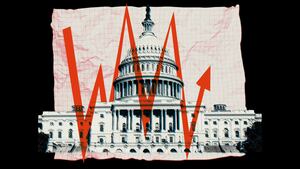Onstage at his recent CNN town hall, former President Donald Trump had a message for Republicans on Capitol Hill: Relax, take a deep breath, and get ready to embrace a catastrophic default on the federal debt.
“I say to the Republicans out there—congressmen, senators—if they don’t give you massive cuts, you’re going to have to do a default,” Trump said.
Trump may have even given up the game, acknowledging that much of his calculation was political. When he was president, he said politicians shouldn’t use the threat of a default as a negotiating tool, but said he was now changing his tune “because now I’m not president.”
“If I win, they're going to be doing the same thing to me in two years, I guarantee you that,” Trump said of Democrats. “They're going to play a very hardball game.”
On Friday, he was perhaps even more explicit on his Truth Social platform, saying “Republicans should not make a deal on the debt ceiling unless they get everything they want (Including the ‘kitchen sink’). That’s the way the Democrats have always dealt with us. Do not fold!!!”
But as Republicans try to force Democrats to accept deep spending cuts in exchange for simply not defaulting on the debt, Republican lawmakers have conspicuously and repeatedly said there will not be a default.
“Everybody knows from the beginning you’re not going to default,” Senate Minority Leader Mitch McConnell (R-KY) said in March. “It’s simply unacceptable, it's not going to happen.”
Despite Trump’s continued influence on Capitol Hill—where many Republicans have endorsed his 2024 presidential bid—a range of GOP lawmakers uniformly steered clear of his comments about defaulting when The Daily Beast asked about them last week.
“What any one individual says about how to dramatize it, that’s up to them,” said Sen. Mike Braun (R-IN), who has backed Trump for 2024.
Other lawmakers blamed Trump’s default comments on the fact that he was running for president, suggesting that context spared Capitol Hill from taking him seriously.
“You know, it is said that people campaign in poetry and govern in prose,” said Rep. Dusty Johnson (R-SD). “I think this is just another example of that.”
“The President is running a presidential campaign,” said Rep. Ryan Zinke (R-MT), who formerly served in Trump’s cabinet. “He’s running to be president again.”
In comparison, Zinke suggested, House members are on “the front lines of the Constitution” as they try to secure a deal that reins in what they argue is the existential threat of a ballooning federal debt.
But Trump’s open flirtation with a default matters more than Republicans might like to acknowledge. It undermines them in that he is unreservedly teasing out the logical conclusion of the GOP’s negotiating position—in a way that could attract public blame if a default does happen.
“Sometimes Donald Trump says the true things out loud,” said Sen. Chris Murphy (D-CT).
“Their entire strategy is predicated on their willingness to default being real and believable,” Murphy said. “Nobody would negotiate with them over their crazy set of demands to kick thousands of kids off nutritional benefits and Head Start if you didn’t think they were.”

Biden is negotiating with Republicans, to the increasing dismay of some Democratic lawmakers, who began the year saying the GOP shouldn’t be rewarded for leveraging the debt ceiling to advance their policy goals.
That in itself is a win for Republicans. But there’s plenty of peril here, too—which Trump may have added to with his remarks. Out of necessity, any deal with Democrats will not contain, as Trump said, “EVERYTHING” the GOP wants. Several Republican lawmakers seem to share that lofty standard, too.
Conspicuously, as Trump issued his renewed call on Friday for Republicans to default if they don’t get a good deal, talks between Speaker Kevin McCarthy’s camp and the White House broke down, with the Republicans leaving the negotiating table.
Close observers of the process warn that Trump’s influence can’t be discounted.
Trump’s default comments, said GOP lobbyist Liam Donovan, were “a real time reminder that he can bigfoot this process if he decides to and it's really the wild card at play.”
“He has been largely invisible and absent from this process, which has been quite helpful to Republicans, but you never know when he might,” he said.
Johnson, who emphasized that “a default would be bad for the country,” said Trump’s comments just “make it clear that lots of Republicans… really think that if we can’t get a good deal, that’s also unacceptable.”
The question will be whether conservatives conclude the deal McCarthy ultimately strikes is preferable to a default—or gives them enough cover with their voters—while being egged on by the GOP’s most dominant figure and presumptive nominee in 2024.
What’s clear in talking to Republicans is that, while they will say a default is unacceptable, they insist that a bad deal to address long-term spending is just as unacceptable.
“Defaulting on our debt is not an option,” McCarthy said in February. “But neither is a future of higher taxes, higher interest rates and an economy that doesn’t work for working Americans.”
Rep. Chuck Fleischmann (R-TN), an ally of leadership, sounded a similar note last week, saying default is unacceptable but “business as usual cannot be the option either.”
“The American people have given us divided government and I think the American people want some form of fiscal responsibility put back in place,” he said.
According to most economists and experts, a default on the U.S. debt—which has never before happened—would cause a widespread level of economic pain that is rarely seen. Seniors, military, veterans, government employees, and other groups would stop receiving paychecks and benefits; Treasury payments would be snared, sending markets into turmoil and overall U.S. economic activity would slow by 10 percent, according to a Goldman Sachs estimate.
Those factors would likely add up to a recession, which could take years to recover from, cost millions of Americans their jobs, and cause interest rates to skyrocket across the board.
The federal debt is a slower-moving concern. The interest payments needed to service the debt are eating up a disproportionate share of the budget, but raising the debt ceiling is just an agreement to pay the debts the United States has already incurred. Many on the right, however, have focused on the debt battle as a way to fight “woke” federal spending and slash programs that they oppose on philosophical grounds for decades.
Talks between Biden and congressional leaders are reaching a key juncture, as the so-called “X-date”—the moment at which the U.S. reaches its borrowing limit and therefore defaults—approaches sometime in June.
On Thursday morning, McCarthy sounded more optimistic than ever about progress toward a bipartisan deal, even raising the possibility that a bill could be put on the House floor next week. Biden has cut short a planned trip to Oceania in order to return to Washington for continued talks. But the breakdown on Friday demonstrated just how fragile these talks are—and how distant a compromise remains.
Part of what has fueled GOP momentum on these negotiations—and given Republicans more room to deflect Trump’s default comments—has been their surprising ability to pass their own bill to raise the debt limit while making steep cuts to the federal budget.
Biden and most Democrats assumed House Republicans couldn’t get their members in line to vote for a bill extending Washington’s ability to borrow. But when they did, it changed the calculus for who’d be blamed if the United States did default. The GOP House could always point out that it passed a bill; the Democratic Senate could not.
“I think default’s not the thing to do,” said Rep. Dan Bishop (R-NC), an ultra-conservative lawmaker who initially opposed McCarthy’s speakership. “That’s the reason I voted in favor of lifting the debt ceiling. We’ve already done that.”
But the more Trump gets involved, said Donovan, the more he can knock that delicate messaging off balance.
“Leverage is derived from the idea that Republicans aren’t afraid of going over the cliff, but that’s baked-in at this point,” he said. “The goal now is to seem like the reasonable, responsible party while it’s the other side playing reckless games. Trump is incapable of playing along, so the best hope is that he just stays out of it.”








